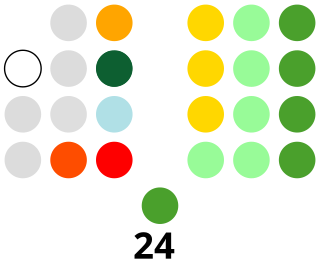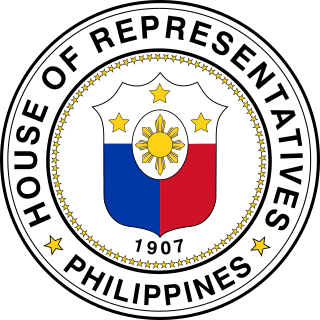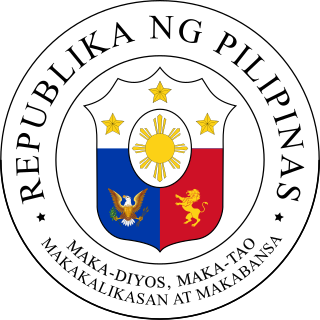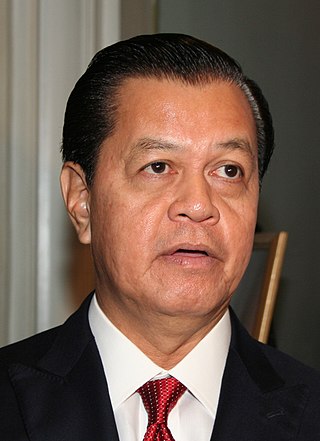These are lists of incumbents, including heads of states or of subnational entities.
Politics in the Philippines are governed by a three-branch system of government. The country is a democracy, with a president who is directly elected by the people and serves as both the head of state and the head of government. The president serves as the leader of the executive branch and is a powerful political figure. A president may only hold office for one six-year term. The bicameral Congress consists of two separate bodies: the Senate, with members elected at-large across the country, and the larger House of Representatives, with members chosen mostly from specific geographic districts. The Congress performs legislative functions. The judiciary is overseen by the Supreme Court of the Philippines and has extensive review jurisdiction over judgments issued by other governmental and administrative institutions.

The president of the Philippines is the head of state, head of government and chief executive of the Philippines. The president leads the executive branch of the Philippine government and is the commander-in-chief of the Armed Forces of the Philippines.

The Congress of the Philippines is the legislature of the national government of the Philippines. It is bicameral, composed of an upper body, the Senate, and a lower body, the House of Representatives, although colloquially, the term "Congress" commonly refers to just the latter. The Senate meets at the GSIS Building in Pasay, while the House of Representatives meets at the Batasang Pambansa in Quezon City, which also hosts joint sessions.

The House of Representatives is the lower house of Congress, the bicameral legislature of the Philippines, with the Senate of the Philippines as the upper house. The lower house is commonly referred to as Congress, although the term collectively refers to both houses.

The 2004 Philippine presidential and vice presidential elections were held on May 10, 2004. Incumbent president Gloria Macapagal Arroyo was elected to a full six-year term with a margin of over one million votes over her leading opponent, movie actor Fernando Poe Jr.

The Cabinet of the Philippines consists of the heads of the largest part of the executive branch of the national government of the Philippines. Currently, it includes the secretaries of 22 executive departments and the heads of other several other minor agencies and offices that are subordinate to the president of the Philippines.
Elections in the Philippines are of several types. The president, vice-president, and the senators are elected for a six-year term, while the members of the House of Representatives, governors, vice-governors, members of the Sangguniang Panlalawigan, mayors, vice-mayors, members of the Sangguniang Panlungsod/members of the Sangguniang Bayan, barangay officials, and the members of the Sangguniang Kabataan are elected to serve for a three-year term.
The 1992 election of members to the Senate of the Philippines was the 24th election to the Senate of the Philippines. It was held on Monday, May 11, 1992. This was the first general election under the 1987 Philippine Constitution. An estimated 80,000 candidates ran for 17,000 posts, from the presidency all the way down to municipal councilors.

Jose Pimentel Ejercito Jr., better known as Jinggoy Estrada or Jinggoy Ejercito Estrada, is a Filipino politician and film actor serving as a senator since 2022 and previously from 2004 to 2016, He is the current president pro tempore of the Senate, having been elected for the second time in 2024 and previously holding the position from 2007 to 2013, He briefly became the Acting Senate President in 2013 after Juan Ponce Enrile's resignation, Before serving in the Senate, he was the vice mayor (1988–1992) and later mayor (1992–2001) of San Juan when it was still a municipality.

The 1986 Philippine presidential and vice presidential elections were held on February 7, 1986. Popularly known as the 1986 snap election, it is among the landmark events that led up to the People Power Revolution, the downfall of the presidency of Ferdinand Marcos, and the accession of Corazon C. Aquino as president.

Presidential elections, legislative elections and local elections were held in the Philippines on May 10, 2004. In the presidential election, incumbent president Gloria Macapagal Arroyo won a full six-year term as president, with a margin of just over one million votes over her leading opponent, highly popular movie actor Fernando Poe Jr.

A general election in the Philippines took place on May 9, 2016, for executive and legislative branches for all levels of government – national, provincial, and local, except for the barangay officials.
The following is the official canvassing of votes by the Congress of the Philippines for the 2016 Philippine presidential and vice presidential election. The canvassing started on May 25, 2016 and ended 2 days later. This was the fastest congressional canvassing process in Philippine electoral history since 1998 until 2022.

The World Cat Federation (WCF) is an international association of cat clubs. It was founded in 1988 in the city of Rio de Janeiro, and continues to have a strong presence in Latin America, Western Europe, and in countries of the former USSR. It is currently based in Germany. There are 370 organizations worldwide associated to the WCF. The current president is Anneliese Hackmann from Essen.
The 2019 Philippine general election was conducted on May 13, 2019. A midterm election, those elected therein will take office on June 30, 2019, midway through the term of President Rodrigo Duterte.










